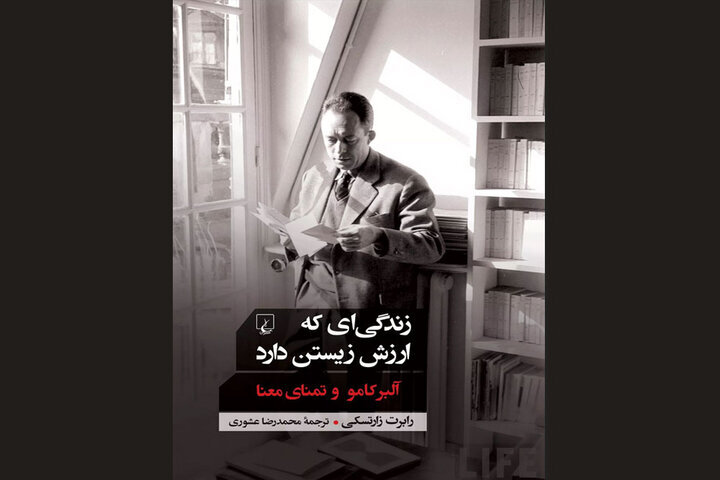“A Life Worth Living” at Iranian bookstores

TEHRAN-A Persian translation of French author Robert Zaretsky’s “A Life Worth Living: Albert Camus and the Quest for Meaning” has recently been published by Qoqnus Publications in Tehran.
The book has been translated into Persian by Mohammadreza Ashouri.
The book delves into the complex and profound philosophy of renowned writer and philosopher Albert Camus. Drawing from Camus’ Nobel Prize acceptance speech, Zaretsky explores Camus’ dual commitment to truth and resistance against oppression. Throughout the book, Zaretsky delves into the themes that fascinated Camus, such as absurdity, silence, revolt, fidelity, and moderation, depicting him as a moralist who challenged conventional perceptions and urged others to question societal norms.
As Zaretsky reflects on Camus’ works like “The Myth of Sisyphus” and “The Stranger,” he emphasizes the enduring relevance of Camus’ ideas in the modern world, acknowledging the different challenges we face today. By embracing Camus’ belief in rebellion as a fundamental part of human existence, readers are encouraged to contemplate their own lives and the pursuit of meaning. Zaretsky illuminates Camus’ philosophy that rebellion against injustice is a noble and vital pursuit, even amidst the inherent contradictions and limitations that come with such idealism.
Camus’ reflections on the balance between rebellion and acceptance, despair and hope, resonate throughout Zaretsky’s exploration of his life and work. By recognizing the beauty in the world alongside its injustices, Camus urges readers to appreciate the enduring presence of joy and resilience in the face of adversity. Zaretsky captures the essence of Camus’ philosophy, encapsulating the enduring message that within the darkest moments, the potential for hope and inner strength remains undiminished.
Albert Camus was born in Mondovi, Algeria, in 1913. He experienced a tumultuous childhood, marked by poverty and the death of his father during World War I. Despite these challenges, Camus excelled academically and went on to study philosophy at the University of Algiers.
He became involved in leftist political movements, but his disillusionment with communism and the Soviet Union led him to embrace a more independent and humanistic philosophy. Camus rose to prominence in the literary world with the publication of his first novel, "The Stranger," in 1942, which explored themes of existentialism, absurdity, and alienation. His subsequent works, such as "The Plague" and "The Myth of Sisyphus," further solidified his reputation as a leading existentialist thinker.
Camus' career was characterized by his commitment to social justice and his opposition to totalitarianism. He was a vocal critic of the French government's actions during the Algerian War of Independence and advocated for peaceful coexistence between French colonizers and Algerian nationalists. Camus's philosophical writings emphasized the importance of individual freedom, personal responsibility, and the rejection of nihilism. His ideas continue to resonate with readers around the world, inspiring discussions on the nature of existence, morality, and the human condition. Albert Camus' legacy as a philosopher and writer is defined by his unwavering dedication to truth, integrity, and the pursuit of a meaningful life in the face of absurdity and uncertainty.
SAB/
Leave a Comment